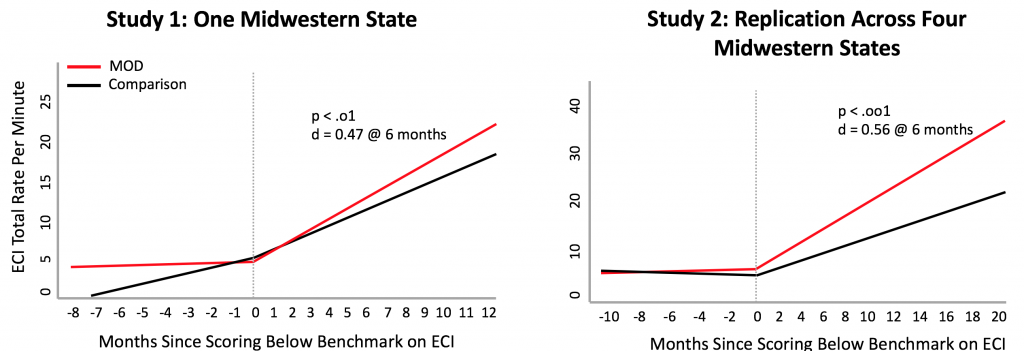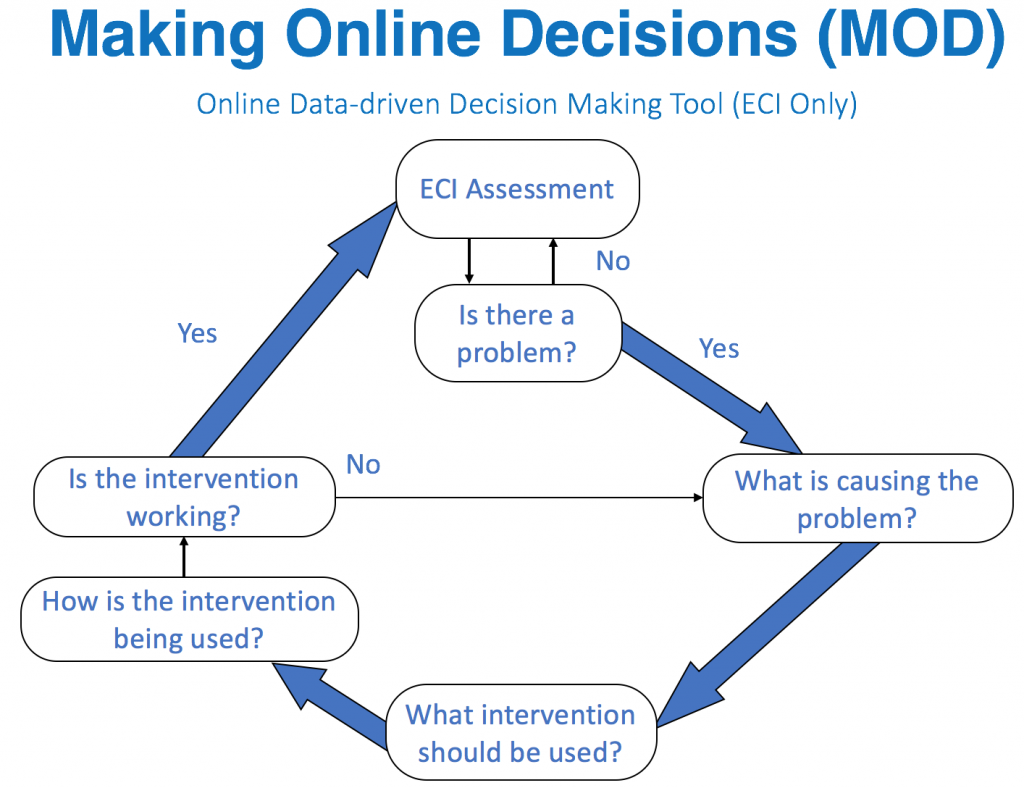Using the MOD for Data-driven Decision Making
Integrated into the IGDI Online Data System, the MOD (Making Online Decisions) system guides infant-toddler educators through data-driven decision-making steps to identify appropriate strategies for children at-risk for developmental delays, and helps monitor the effects of those strategies.
The MOD recommends strategies that are tailored to a chosen curriculum and address possible delays in communication, problem solving or motor skills depending on the chosen IGDI measure.

The MOD uses a systematic set of steps and IGDI data to identify appropriate intervention strategies. These steps summarized in the diagram and description below. The description uses the ECI as an example but can also be applied to the EMI or EPSI.
- Is There a Problem? Children whose ECI score is at least -1.0 SD below the ECI’s age-based benchmark are identified as not making adequate progress and the child’s growth chart is examined.
- What is Causing the Problem? A list of clinical issues linked to poor progress are considered and ruled in or out. For example, the MOD asks if the child has a medical issue (e.g., hearing loss) or issues at home (e.g., changes in the home environment such as the birth of a sibling) that may be associated with reduced language performance?
- What Intervention Should be Used? Using advanced algorithms, the MOD recommends parent-delivered language promotion strategies based on the child’s ECI data. From these recommendations, the educator chooses strategies based on her experience and collaboration with the family to share with caregivers, who are taught and coached to use them during daily routines. Strategies integrated into the MOD are the evidence-based PC-TALK strategies for parents and primary caregivers.
- Is the Intervention Being Done? Using fidelity checklists embedded in the MOD, the educator documents the degree with which the strategies are being implemented with the child, and enter these data into the MOD to help guide subsequent coaching of the caregivers.
- Is the Intervention Working? The MOD monitors, analyzes and reports to the HV the child total communication before and after intervention; and given a lack of improvement, recommends revising the intervention, and the cycle repeats (Tilly, 2008), or given progress, the intervention is updated based on the ECI data and new strategies recommended.
References
Buzhardt, J., Greenwood, C., Jia, F., Walker, D., Schneider, N., Larson, A., Valdovinos, M., and McConnell, S. (2020). Technology to Guide Data-driven Intervention Decisions: Effects on Young Children at Risk for Language Delay. Exceptional Children. Doi: 10.1177/0014402920938003
Buzhardt, J., Greenwood, C. R., Walker, D., Jia, F., Schnitz, A. G., Higgins, S., Montagna, D., & Muehe, C. (2018). Web-Based Support for Data-Based Decision Making: Effect of Intervention Implementation on Infant–Toddler Communication. Journal of Early Intervention, 40(3), 246-267.
Buzhardt, J., Greenwood, C., Walker, D., Anderson, R., Howard, W., Carta, J. (2011). Effects of Web-Based Support on Early Head Start Home Visitors’ Use of Evidence-Based Intervention Decision Making and Growth in Children’s Expressive Communication. NHSA Dialog: A Research-to-Practice Journal for the Early Childhood Field, 14(3), 121-146.
Buzhardt, J., Greenwood, C., Walker, D., Carta, J., Terry, B., Garrett, M. (2010). A Web-based Tool to Support Data-based Early Intervention Decision Making. Topics in Early Childhood Special Education, 29 (4), 201-213.
Tilly, W. D. (2008). The evolution of school psychology to a science-based practice: Problem solving and the three-tiered model. In A. Thomas & J. Grimes (Eds.), Best Practices in School Psychology V (Vol. 1, pp. 17-36). Washington, DC: National Association of School Psychologists.
Walker, D. Bigelow, K. Harjusola-Webb, S. (2008). Increasing communication and language-learning opportunities for infants and toddlers. Young Exceptional Children Monograph Series #10, 105-121.
